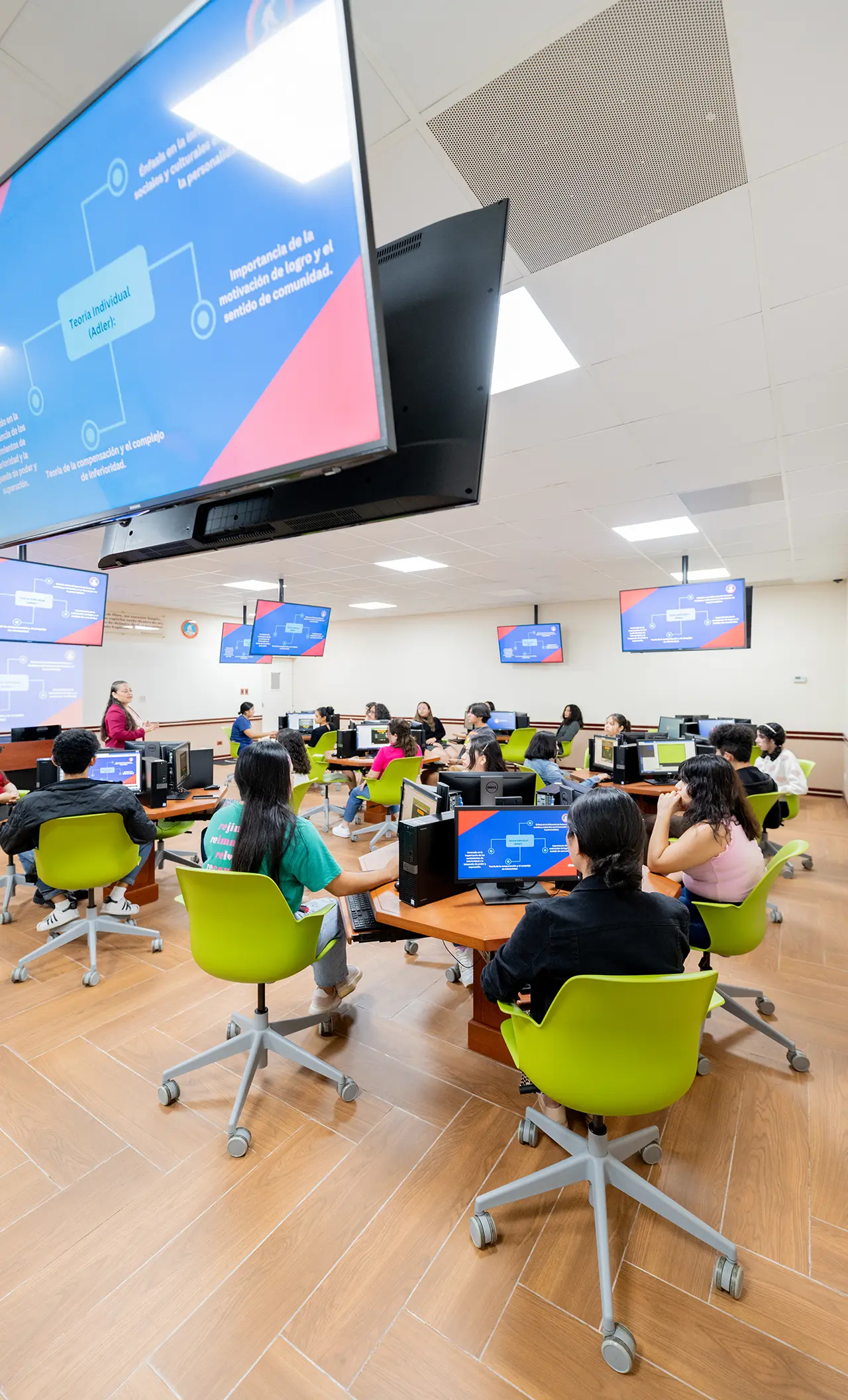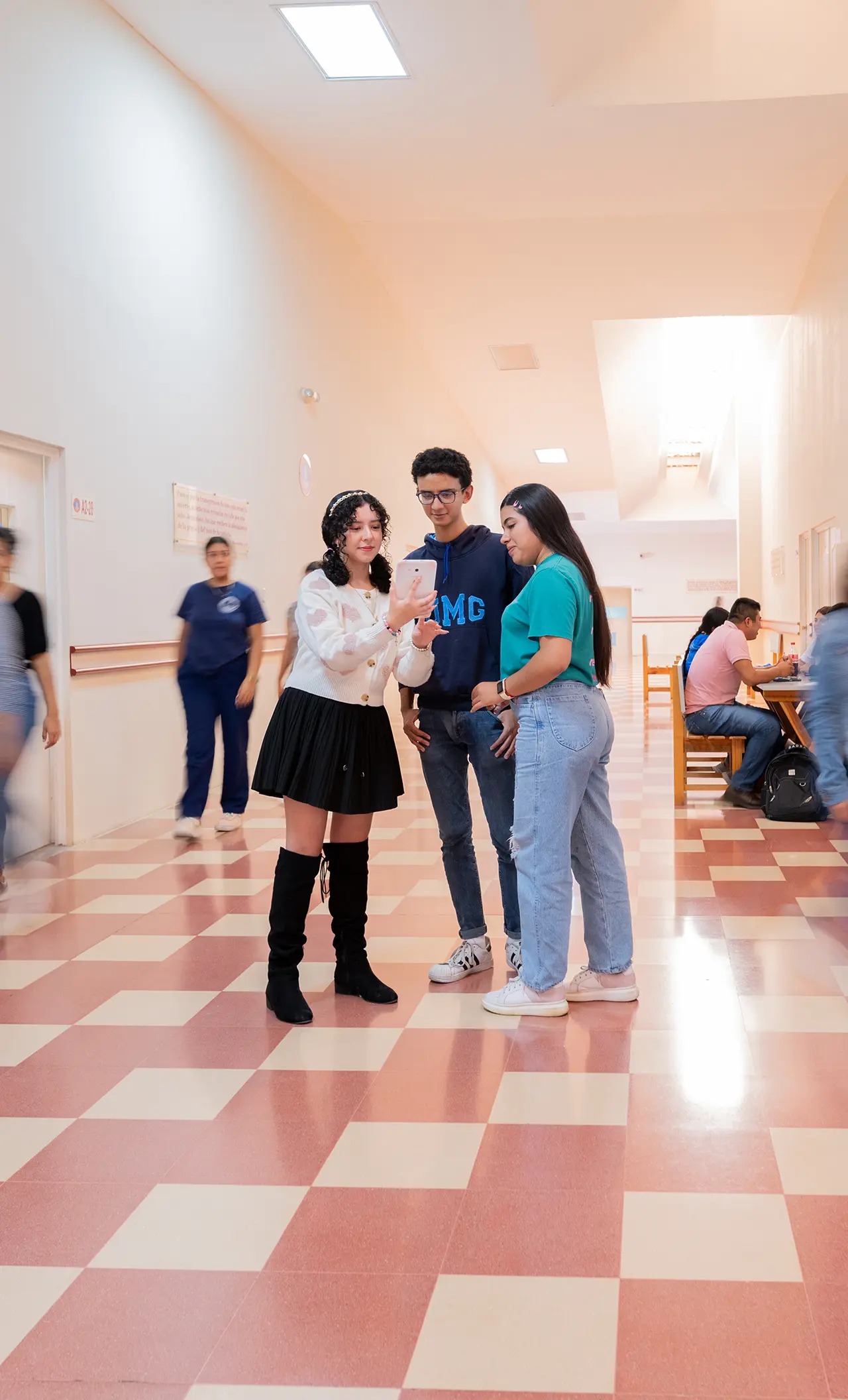
- Bachelor's Degree in
- Industrial/Organizational Psychology
- Degree to be obtained
- Bachelor's Degree in Industrial/Organizational Psychology
- Academic degree
- Bachelor's Degree
- Duration
- 5 years
- Modality
- In-person and virtual
- Schedule:
- All schedules
- Career description
-
This career promotes academic excellence through the implementation of a program that integrates theoretical, methodological and practical aspects of organizational psychology, human resources management and human behavior. The program is taught by professors who are specialists in the scientific study of human behavior and organizational development of human behavior and organizational performance.
- What will you learn during the program?
-
The professionals trained at the School of Psychology have a comprehensive preparation being able to identify, diagnose and intervene in employment problems and processes, allowing them to perform as professional in the following activities:
Human Resources Director.
Consultant in organizational training and development.
Personnel trainer and developer.
Recruitment and selection manager.
Gallery
AdmissionProfile
The applicant to the Bachelor's Degree in Psychology should be characterized by:
- Identifies oneself with a humanistic conception and interest in impacting individual and social problems related to human behavior.
- Is skilled in the use of cognitive strategies for learning and shows a high disposition to develop such cognitive approaches.
- Possesses a level of biopsychosocial development, expressed in terms of mental health.
- Demonstrates moral, spiritual and ethical integrity and attitudes in all actions performed as a daily practice of values.
- Shows disposition for teamwork and ability in the use of tools for permanent self-learning.
Graduate'sProfile
Is a Psychology professional; ethical in his attitudes; congruent; proactive; mentally healthy; sensitive to the needs of his community; a permanent promoter of the quality of life of people, groups or institutions with which he interacts on a daily basis.
Is capable of recognizing and reflecting on the scope of their actions as a professional and as a person, therefore, assuming responsibility for them and keeping themselves updated.
Knows in an integrated way, the theoretical-conceptual, methodological and technical principles of Psychology, which allow them to characterize, understand and explain human behavior present in the problems and social needs of their field of study. Makes creative and informed decisions that allow them to implement the psychological intervention strategies of greater impact in the solution of identified behavioral problems. Collaborates in the resolution of problems that involve the participation of other professionals.
Dominates with expertise the strategies, procedures and tools that allow them to influence the psychological processes of behavior, related to the problems and/or social needs that arise in their professional field.
He is characterized by their ability to recognize the contextual factors that affect the situation and, therefore, act in a relevant manner.
Coexists in a context of equality and co-responsibility with other professionals, being able to work in collaborative teams, recognizing the limits of their work environment, and communicating assertively with themselves and with others.
Career Opportunities

The professionals of the School of Psychology have a comprehensive training being able to identify, diagnose and intervene in work processes and problems, allowing them to develop in the following areas:
Human Resources Director.
Consultant on organizational development.
Personnel trainer and developer.
Recruitment and selection manager.
Curriculum
| 1° Ciclo | BIOLOGÍA HUMANA | DESARROLLO HUMANO Y PROFESIONAL | FILOSOFÍA | SOCIOLOGÍA GENERAL | |
|---|---|---|---|---|---|
| 2° Ciclo | ANTROPOLOGÍA GENERAL | LÓGICA FORMAL | METODOLOGÍA DE LA INVESTIGACIÓN | PSICOLOGÍA GENERAL | |
| 3° Ciclo | ANATOMÍA Y FISIOLOGÍA DEL SISTEMA NERVIOSO | ESTADÍSTICA FUNDAMENTAL | PSICOLOGÍA EVOLUTIVA DEL NIÑO Y DEL ADOLESCENTE | SEMIOLOGÍA PSICOLÓGICA | |
| 4° Ciclo | ESTADÍSTICA APLICADA A LA PSICOLOGÍA | PSICOLOGÍA EVOLUTIVA DEL ADULTO | PSICOMETRÍA I | TEORÍAS DE LA PERSONALIDAD | |
| 5° Ciclo | NEUROFISIOLOGÍA | PSICOLOGÍA DEL DEPORTE Y LA RECREACIÓN | PSICOLOGÍA SOCIAL | PSICOMETRÍA II | |
| 6° Ciclo | FUNDAMENTOS DE INFORMÁTICA | INTRODUCCIÓN A LA PSICOLOGÍA FORENSE | INTRODUCCIÓN A LA PSICOLOGÍA INDUSTRIAL/ORGANIZACIONAL | PSICOLOGÍA CLÍNICA | |
| 7° Ciclo | COMPETENCIAS LABORALES | COMPORTAMIENTO ORGANIZACIONAL | LEGISLACIÓN LABORAL | PLANEACIÓN ESTRATÉGICA DE RECURSOS HUMANOS | TEORÍA ADMINISTRATIVA |
| 8° Ciclo | ANÁLISIS Y VALUACIÓN DE PUESTOS | DESARROLLO ORGANIZACIONAL | ELABORACIÓN DE PROYECTOS | PROVISIÓN DEL TALENTO HUMANO | PSICOMETRÍA LABORAL |
| 9° Ciclo | DESARROLLO DEL TALENTO HUMANO | ELABORACIÓN DE TRABAJO DE GRADUACIÓN I | GESTIÓN DE PROYECTOS | GESTIÓN DEL DESEMPEÑO | PRÁCTICA SUPERVISADA I |
| 10° Ciclo | ELABORACIÓN DE TRABAJO DE GRADUACIÓN II | GESTIÓN DE INDICADORES LABORALES | GESTIÓN DE LA COMPENSACIÓN | PRÁCTICA SUPERVISADA II | SEGURIDAD INDUSTRIAL Y SALUD OCUPACIONAL |


